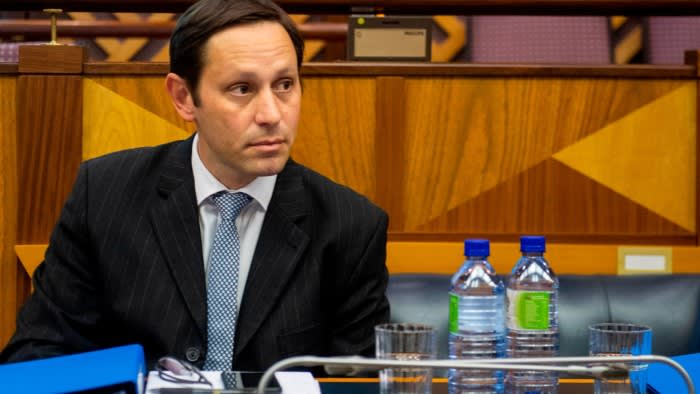Stay informed with free updates
Simply sign up to the Retail & Consumer industry myFT Digest — delivered directly to your inbox.
Steinhoff’s former finance director has been sentenced to five years in jail, becoming the most senior executive to be convicted for their part in a €6.5bn fraud at one of Europe’s biggest furniture retailers.
Ben la Grange, who pleaded guilty on Thursday, was also handed five years suspended in addition to actual prison term. His sentence was mitigated because he had offered full co-operation with South Africa’s authorities for many years and “shown remorse”, prosecutors said
The conviction of the former chief financial officer was the second in the Steinhoff case in the past week and comes more than six months after Markus Jooste, the former chief executive who was accused of masterminding the fraud, died by suicide.
The case sparked criticism in South Africa over the time it took to bring perpetrators to justice. Steinhoff, which was listed in Frankfurt and Johannesburg, first admitted to “accounting irregularities” in December 2017, sparking a 98 per cent slide in its shares.
At its height, the company was the second largest furniture retailer in Europe after Ikea, with brands including Pepco, Bensons for Beds, Poundland and Conforama.
Forensic investigators from PwC found in 2019 that Jooste had masterminded the fraud by creating “fictitious and Irregular” transactions that “substantially” inflated profit and asset values.
The former boss shot himself in the seaside town of Hermanus in March, a day after he and former company secretary Stephan Grobler were named as lead suspects and ordered to face charges of fraud and insider trading.
In Jooste’s absence, prosecutors later added the 50-year old La Grange to the charge sheet, focusing on a handwritten invoice worth €23.5mn, which Jooste had given him in November 2016.
The former chief executive had told him it was a “rebate” due to Steinhoff from a company called the TG Group and La Grange organised for Steinhoff to process the invoice, boosting Steinhoff’s profit by the same amount. However, it was a “complete fabrication”, prosecutors said.
In his plea, La Grange said he knew that this was “not a true and genuine invoice” and had resulted in Steinhoff’s accounts being “not truthful and correct in material respects”. He had previously said he had not known the invoice was a fake, but had trusted Jooste.
While La Grange is the most senior executive to be convicted, he is not the first one linked to the fraud to be found guilty.
Two former Steinhoff Europe executives who helped Jooste create the paper trail for this fraud, Siegmar Schmidt and Dirk Schrieber, were prosecuted in Germany and given jail sentences this year.
La Grange’s conviction came a week after prosecutors secured their first South African conviction in this case. Gerhardus Burger, Steinhoff’s 79-year-old doctor and a family friend of Jooste’s, last week pleaded guilty to insider trading, and received a five-year suspended sentence.
One week before the fraud emerged in 2017, he had received a message from Jooste warning him of “bad news” and advising him to sell Steinhoff shares and delete the text message.
Christo Wiese, Steinhoff’s chair at the time of the collapse, told a local radio station last week that there will not be “full justice” in this case because the main culprit “will not be held to account in a court of law.
Jooste died without providing an explanation for why he had constructed a multi-jurisdictional fraud that not only shone the spotlight on South Africa’s corporate governance, but also on how he managed to dupe auditors Deloitte into signing off Steinhoff’s financial statements.
Deloitte eventually paid a R1.3bn (€67mn) settlement to Steinhoff’s creditors, without admitting liability.


